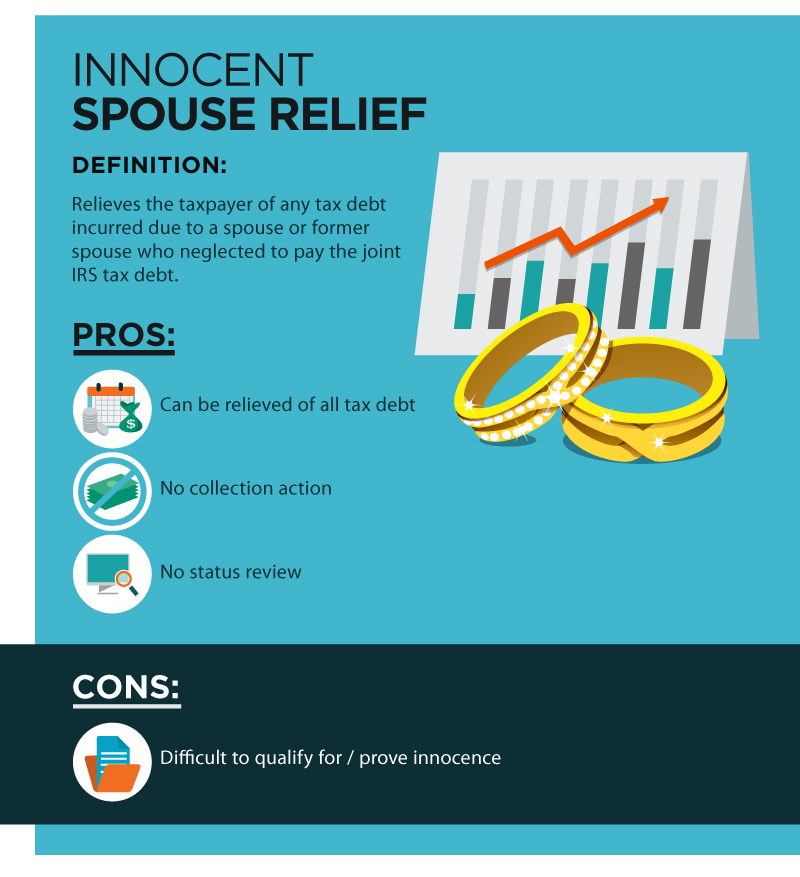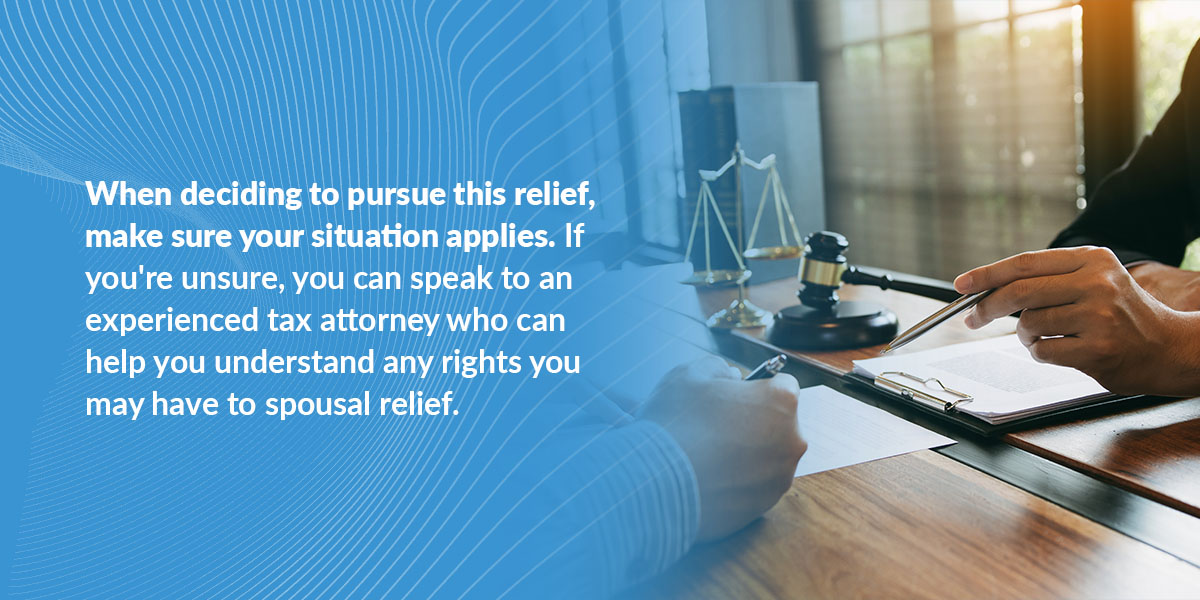
100+ Years of Combined Tax Resolution Experience.
100+ Years of Combined Tax Resolution Experience.
Do you know why most married taxpayers go for filing joint tax returns? It’s actually because of the benefits that it offers. But with joint tax returns, both the filers hold the responsibility for the tax bill or any penalties and interest that arise from it. Both are legally responsible for the entire liability, even if one spouse doesn’t report income or reports it incorrectly. But in case your spouse or former spouse has made any errors while filing for tax, you thankfully have a way to not be penalized by having to pay additional taxes. Read through the next few lines to know exactly how and save yourself from extra tax penalties.
Table of Contents
What is Innocent Spouse Relief?
Innocent spouse relief helps provide relief from any cases or situations where your spouse or former spouse has incorrectly reported their income or claimed improper deductions or credits from it. It has a criterion or set of qualifications to be met for the IRS
to consider your request. Remember, be very sure when applying because the IRS can deny your request or, in some cases, take up to 6 months to process your application causing unnecessary stress.
How Do You Qualify for Spouse Tax Relief?
To apply for innocent spouse relief, you will need to fill out Form 8857, Request for Innocent Spouse Relief. Use the most recent form revisions. After you submit the form, the IRS decides how much tax, if any, you are responsible for.
To qualify for this relief, you must meet the following conditions.
Filed Joint Return
You and your spouse will need to have filed a joint return featuring a tax understatement due to items of error. Erroneous items include your spouse’s unreported income and any incorrect deductions, basis or credit your spouse has claimed.
No Reason to Know
You will need to prove that when you signed your joint tax return, you did not know of or had no way of knowing of a tax understatement. You must show to the IRS that you were unaware of errors on the tax return and that a person of sound mind in circumstances like yours would have also been unaware of those errors.
When determining whether you would have reasonably known about the errors, the IRS will consider many factors, including the nature of the errors, your joint financial situation, your business experience, your educational background and whether the mistakes represent a break from a recurring pattern reflected in your previous tax returns.
Applicable Facts and Circumstances
When deciding whether holding you accountable for the taxes owed is fair, the IRS looks at several factors. They will need to see that due to the facts and the circumstances of your life, relationship and finances, it would be unfair to hold you liable for the understatement of taxes. The facts and circumstances considered include the following.
- Significant benefit: The IRS will consider whether the understatement gave you a significant benefit, based on your financial situation. A significant benefit exceeds the support you would usually receive based on your specific circumstances. Direct and indirect benefits include property transfers, including those you may receive years after filing the understatement.
- Relationship status: The IRS will also consider the state of your spousal relationship, including whether your spouse has deserted you or whether you two are divorced or separated.
No Transfers of Property
You and your spouse must not have transferred property to one another as part of a fraudulent scheme. These include plans to illegally obtain money from the IRS or another third party, like a creditor, business partner or ex-spouse.
Qualifying for Partial Relief
You may receive partial tax relief if you did not know or had no way of knowing about the taxes owed when you filed the tax return. Even if you knew of some of the erroneous items, if others come as a surprise, you can try to prove this to the IRS. If the agency approves your appeal, and you have met all other above requirements for that portion, you’ll be free of the understatement regarding that specific unknown error.
Keep in mind that the Internal Revenue Service will observe and take notes of everything, including your financial and educational background and the nature of the filing error, amongst other factors. It is thus advisable that you seek the help of a professional who is skilled in tax provisioning and has experience related to innocent spouse relief.
What Does Innocent Spouse Relief Cover?
While innocent spouse relief can help you avoid unfair payments, you can only receive it for specific types of taxes. This relief can go toward individual income and self-employment taxes. You cannot receive spousal relief for other taxes, such as business taxes, individual shared responsibility payments, business trust fund recovery penalties and household employment taxes.
When deciding to pursue this relief, make sure your situation applies. If you’re unsure, you can speak to an experienced tax attorney who can help you understand any rights you may have to spousal relief.
What Happens if I Don’t Qualify for Innocent Spouse Relief?
For taxpayers who fail to qualify for the innocent spouse relief, there are two options;
- Separation of liability relief
If you haven’t lived with the other person for over 12 months before making the request, you can be eligible for this. To qualify, you must either be a widow, divorced, or living separately. In such cases, the Internal Revenue Service allows you and the other person to pay the bill separately, dividing it into sections so that each person is responsible for paying their section only.
- Equitable relief
To be eligible for this relief, you must establish that it would be unfair to hold you liable for the deficiency or underpayment of the taxes under any circumstances. This can also be an option for a taxpayer who didn’t file for joint tax returns but lives in a state where income is considered shared.
How Do I File for Innocent Spouse Relief?
There can be two ways to go about this. You can either submit the IRS form 8857 (which will be complicated and lengthy, so it is better to consult someone with more knowledge of the business here) or submit a handwritten statement detailing all the information. The IRS will then determine the tax you are responsible for paying. There are a few things to keep in mind, though:
- The IRS will inform the other person about the claim you made, and they will be allowed to provide any information in favor or against it to benefit the case.
- The penalty has to be paid by the other person entirely in case you are exempted from it.
- If, in case, you paid the bill before filing for the innocent spouse relief, the IRS will only refund the amount that you paid from your own money.
- Some taxes don’t qualify for the relief. For these cases, you will both be liable to pay your share of the tax.
A Lack of Knowledge Can Cost You
The most problematic yet common problem occurs when a taxpayer files for relief because they are unaware of the error in the file. It may be proved that they did not know, but sometimes, the court states that they should have known nonetheless. Also, some court rulings expect the taxpayer to properly review each section of the tax return and rightly so, it is important to investigate any suspicious accounts or parts properly.
Thus, it is important to remember that the lack of knowledge rule holds a taxpayer responsible for not knowing the error beforehand or not reviewing their application before filing for tax returns. So they are expected to pay the tax or penalty imposed on them by the Internal Revenue System if there isn’t enough proof to get them exempted.
With so many complicated rules and sections of the law that need to be kept in mind while filing for tax returns or even applying to get relief, it is best to get in touch with a tax specialist and let them handle your matters. It will not only save you time and money, but you will also be able to benefit from their expertise as they make sure you have a smooth experience. To make your life easier and stress-free, contact us today and get a skilled tax specialist on your team as you get ready to face the IRS!
Additional Readings

Do you know why most married taxpayers go for filing joint tax returns? It’s actually because of the benefits that it offers. But with joint tax returns, both the filers hold the responsibility for the tax bill or any penalties and interest that arise from it. Both are legally responsible for the entire liability, even...

We’re in an era in which more small businesses are launching like wildfire. Many people find starting a small business of their own as easy as a piece of cake. However, most of the time, what they fail to prioritize are some of the major players involved in smoothly operating their small business. A...

What if you owe so much in taxes that you can’t see your way out of it? If you owe back taxes, you might not think there is a way you can ever pay things off. And the more those back taxes have accumulated, the deeper the hole. But that doesn’t mean you can’t dig...

Tax Audits are one of the most terrifying things a taxpayer can endure. Most taxpayers don’t know what being audited by the IRS entails and usually don’t know what to do if they are audited. IRS audits can be confusing to most taxpayers as most don’t know what the IRS is looking for when they...

Receiving a letter from the IRS can be intimidating, especially if you’re unsure what the notice is for or what to do next. Fortunately, many notices are nothing to worry about and are purely informative. Below, we look at everything you need to do — and what not to do — after getting a notice from the...

The Internal Revenue Service (IRS) is increasing audits on cannabis businesses — the agency is on a mission to ensure that cannabis businesses adhere to the tax code. Unfortunately, cannabis companies must comply with more strict tax laws than other businesses and can claim fewer deductions. Most business owners don’t realize this or aren’t able to meet the reporting responsibilities on their own. If you own a business in...


